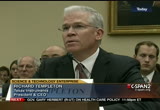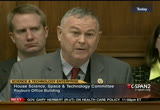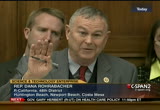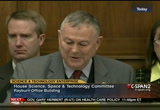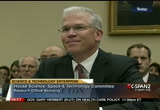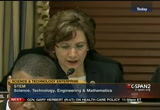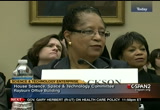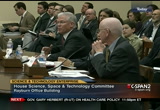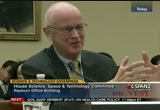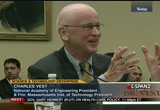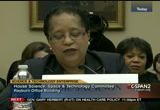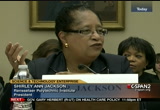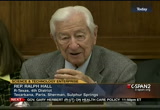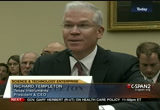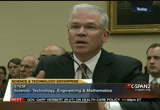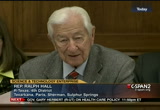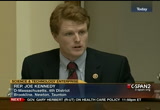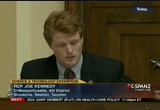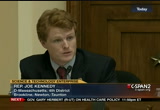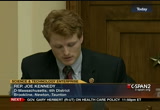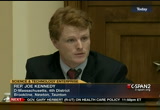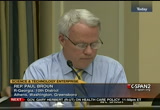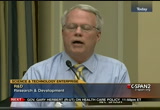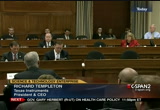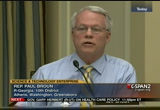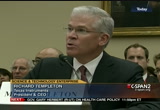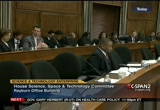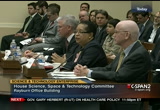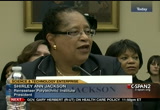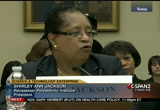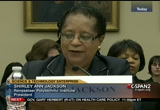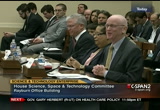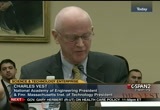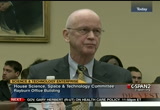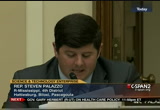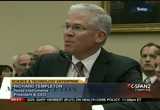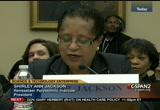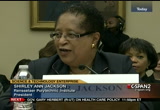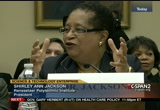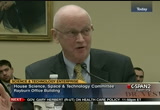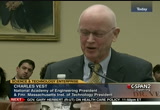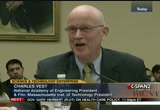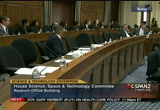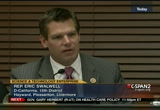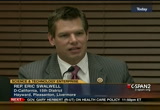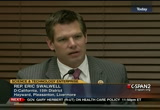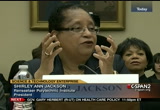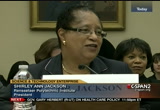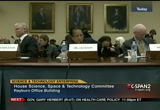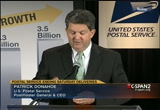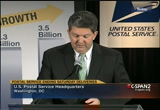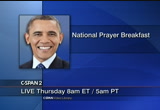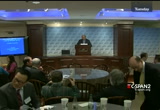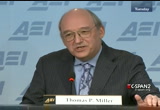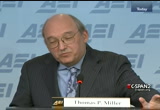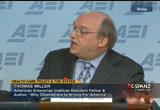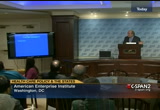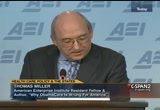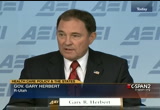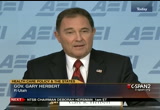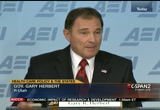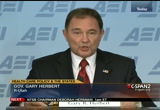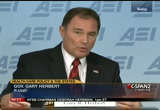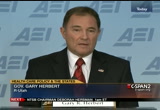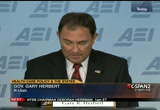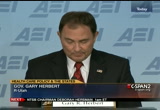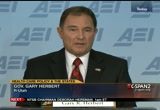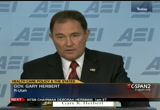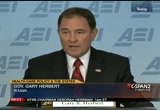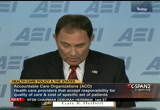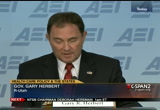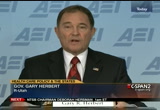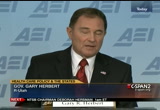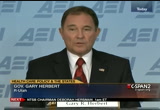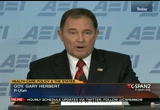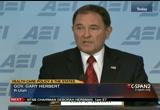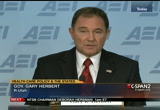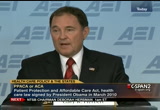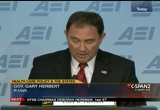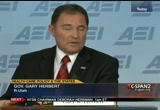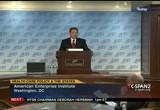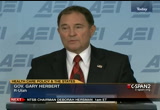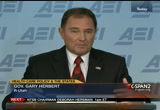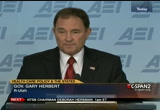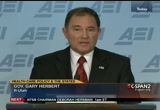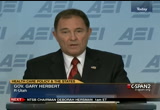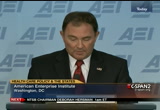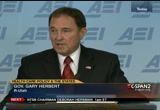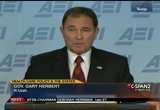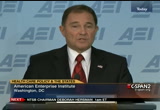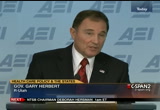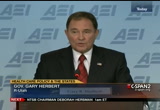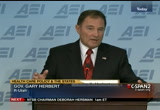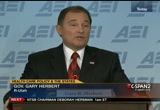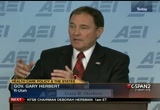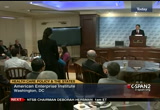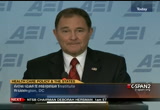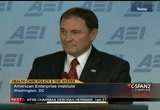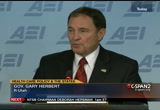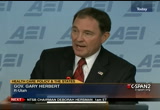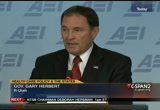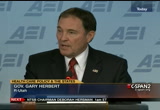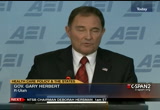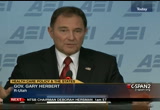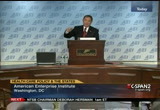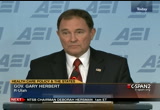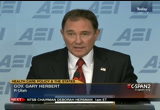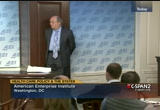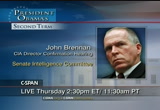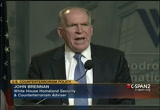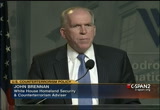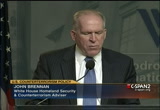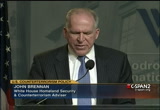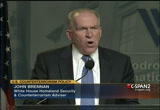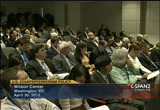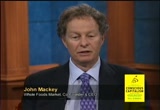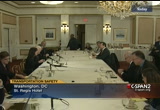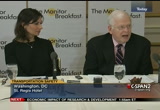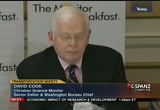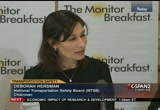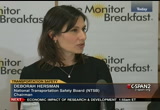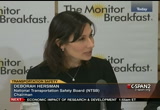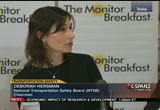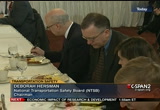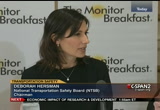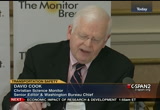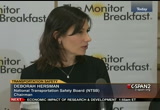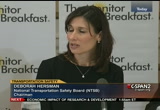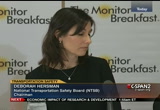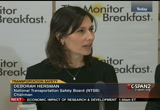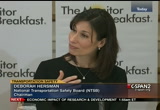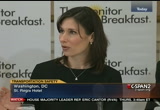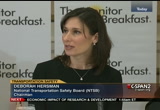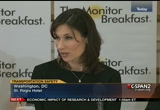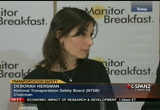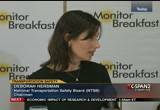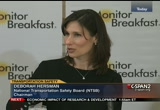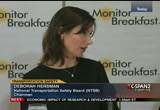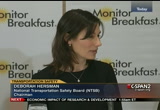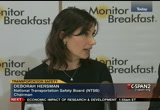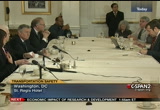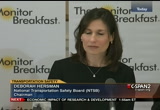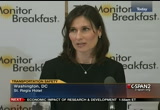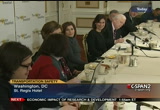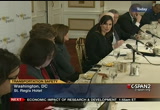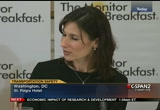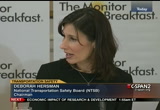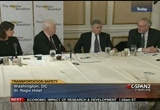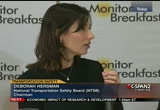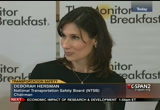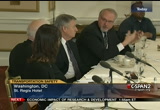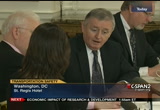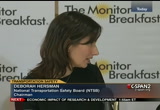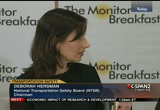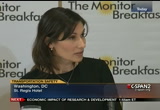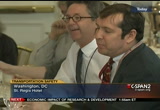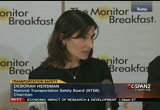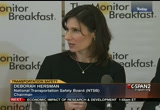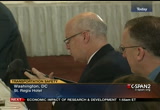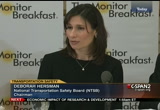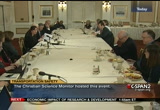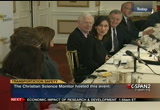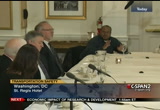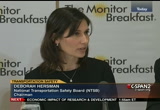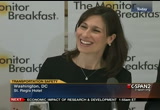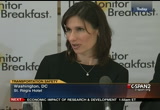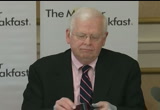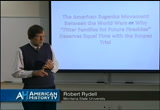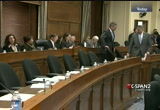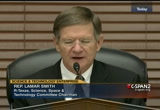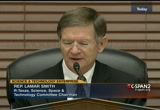tv Capital News Today CSPAN February 6, 2013 11:00pm-2:00am EST
11:00 pm
i would estimate probably 40% of our ships are manufactured in the u.s. but we also come into your question, many facts are some in europe, facilities and japan were global manufacturing. >> to be a very small percentage right now. >> 10%? >> significantly less. >> are major components to your industry engaged in manufacturing these types of things in china. >> their other part that
11:01 pm
manufacture. we appreciate that investment. it says here we have $409 in this type of research going on. does that $400 billion annually, does that calculate with individual inventors put into the mix, or they just not part of the calculation? >> are probably not going to be significant percentage as measured by dollars but about 60% would come from private companies than 40% of the federal funded. >> were talking about private inventors and their impact on new discoveries. how is she placed them in terms of government programs coming up with something new, corporations
11:02 pm
coming up with something new versus the individual inventor community coming up with something new. >> if you look at the types of recruiters over the past 50 years, the invention of the transistor or art or not tended to be basic research programs that weren't in the minds of any one individual, even at the university, but typically a network universe be a people. >> the foundation isn't very significant portions made in creating something put to use in the marketplace. my time is running here, but just in terms of the inventors, and we heard about the investment again and government
11:03 pm
provided the directory search that ended out in the very end of the process was the mri. i know the guy who has the patent for the mri. without him, there wouldn't have been an mri as well. do you think there's patent protection for these innovators, inventors is going to the right direction or the wrong direction? >> in general come as a positive direction of the past eight years to find the careful balance that was good to protect convention, but not move off into layer many debates go around that topic, depending who you are coming of a strong opinion one way or the other. >> the chairman and i've difference of opinions on this. thank you for sharing your reviews. and thank you, mr. chairman. >> thank you, mr. rohrabacher.
11:04 pm
>> thank you, mr. chairman. in thank you for scheduling this hearing. thank you to the witnesses, palace. really appreciated the article in "politico," mr. templeton and dr. jackson. the testimony contains many common elements indeed their topics frequently discussed in this room, especially importance of promoting s.t.e.m. education in maine gaming americas leadership position in the global economy. what i'm talking with constituents and industry leaders about the topic in my district in oregon, especially the role creativity and integration play in driving our economy forward. many express the education integrating arts and design in stem fields, innovative companies across my district across companies like nike and
11:05 pm
tech giants like intel rely on employees at the mine for science and eye for design. we discussed how science education can yield the innovative workforce that many of you identify is essential. beyond the benefit for the industry but in art and design can help keep students engaged and he talked about trying students in and i want to tell you i visited an elementary school in my district that took s.t.e.m. and added arts and design. biscuits are engaged, acting things have, studying soil erosion and graphing things and drawing charts and planning a garden. they were really engaged in everything they were doing. in order to keep students
11:06 pm
engaged, i want to have a discussion about steam. do you understand government conduct basic research will industry focuses on the developing site of commercial that location in your experience, can you discuss the product development process. he discussed improving learning first inning and suggested promoting exciting learning for projects and experiences rather than just boring memorization of facts. arts and design play a role in s.t.e.m. education, especially the learning atmosphere you envision. >> well, on the aspect of creativity, the simple answer on that is yes is something to the numbers and concepts that cannot be brought together and
11:07 pm
visualized and turned into a product. it will not lead to productive things. it's also the case if you look at efforts we've recently done something with one of the school districts in north texas and i think it's got great potential for the creativity. i do think it important while they look at that, back to dr. jackson's comments that we have to be mindful of the basis come to be at the math and science principles because if we don't have the foundation in place, you can never get to higher-level concepts as well. keeping us in balance is a wonderful thing. >> it's a very perceptive question in my view and when i get excited about, so you may have to shut me off, mr. chairman. i cannot imagine m.i.t. but that its visual and performing arts component.
11:08 pm
we would not attract the same kind of kids. is very much about having the k-12 and undergraduate in our universities rising above the gathering storm tried to emphasize. what not to let markets who want them to become scientists and engineers, but everybody pays to know fundamental today about science and engineering. my experience if you look at virtually any really good high school succeeding, high tech high in san diego forth, the integration of arts and curriculum is a very important part. i commented on the maker movement. this attracts kids from last spring, game, everything in between. i'm frankly a bit reliever in
11:09 pm
this theme movement. there's a hearing in congress over the next several of my wonderful friend sean may said from the rhode island school of design is helping to organize. -- [inaudible] >> it leaves me in a position because they know we are failing in our course and area, so it's difficult to talk about the breath, but arts and humanities are very important part of building creativity. >> i'm afraid i'm out of time. >> you didn't pose the question to me, but we leave so much we've built an experimental medium performing arts center and it is those very high and, cultural and performing arts platform and a research platform that brings the arts
11:10 pm
engineering, computer science is altogether and we have various venues within it. one in particular allows us visualization, animation, brought this requires the disciplines together, we have a the stimulation arts and science and defuses subtle structure to animate the students do. but at the same time, we feel fundamental studies in certain fields of the humanities arts and social sciences are critically important in with both those up as well. we've gotten into the spec is about what constitutes liberal arts versus what constitutes science and engineering. if you go all the way back to cardinal newman about the original definition of liberal arts, they were in fact together. >> i'm out of time and that
11:11 pm
meeting is a week from tomorrow i'm all a committee members know the to attend. >> thank you, ms. bonamici. the gentleman from texas, mr. hall is recognized. >> thank you, mr. chairman. this is a very unusual and talented group is giving us your time. the time it took to get here, the time to appear before us, give us testimony and get back to your place of occupation. i know rich templeton very well and did hire him. eddie bernice and i have asked you to come here. we are proud of t.i., cecil green and all of this hoopla created university of texas at dallas have our very generous in giving 1100 acres to take
11:12 pm
university. i was the senate sponsor of the guy from the house and am very proud of the university of all created by mr. orla bacher -- rohrabacher talk to bacher supports. i'll ask you one question about s.t.e.m. graduates and i know your train finally became a reality in 1986 in the students that you have. what about the s.t.e.m. graduates? are there no major current and future needs? >> mr. hall, thank you for the complimentary statements of the founders that m.i.t. and rpi. if you look in many ways the percentage or none of people we hire on an annual basis are
11:13 pm
fortunate because of the reputation there's enough available. that does not apply to all industries as we go down through that and not supplied will be under pressure if we don't get k-12 stem education in the current direction. [inaudible] >> to pursue s.t.e.m. degrees. >> i had to leave and i have to leave soon to go back to another committee to vote. i'm sorry to catch on it a second time. >> comic a very simple. make the business, live. if you look at any high school
11:14 pm
student, especially women trying to consider a career in science and technology, if you get to the undergraduate level that dr. jackson's heart about, if you see nothing but four years of math and science classes before you can apply to something that makes it come to life, uses a lot of people during that time. we look at bioengineering to where you can see the impact and it really brings the potential career and impact the lives unless the secret to grow and turn that trend around. >> it's federal government to implement to strengthen their nations and maximize taxpayer dollars? are your witness to that? >> i pay attention more to results. right now if i look results coming out in s.t.e.m.
11:15 pm
education, we continue to be ranked so i'm most global ranks in the work we have is the nation is still in front of us on that. >> thank you, mr. chairman. >> gentleman from massachusetts, mr. kennedy is recognized. >> thank you for calling this hearing. witnesses, thank you for your testimony. as a resident of its should be aware of the are indeed in appreciate your time coming here today. president templeton, the core question that slightly off topic but an important factor in the district of massachusetts. mr. chairman, i hope you'll forgive a quick diversion. as i'm sure you're aware of, texas instruments operated manufacturing facility for several decades until it was
11:16 pm
sold in 2006 the company was a major employer and active member of the local community. the remains well respect did in the city and surrounding area today. that being said in the years since the attleboro plant was closed in the cancer rate amongst former employees have been specifically affected those men and women employed by the company to 1963 in 1961 t. i was involved in the program. that's part of the energy employee compensation program for department of labor, money has been made available to those workers now suffering from crippling illness. i know ta has designated point person for oic and i commend you for doing so. what i'm hearing from many residents in the district is very few of the thousands of employees in the area or even a way that this program access and
11:17 pm
its benefits available to them at all. they seem minimal outreach efforts to ensure those in need know how to get the help they so deserve. i read this week about steve totten in a local newspaper. his brother also has cancer. his wife and father both died of cancer. all four worked in the attleboro plant. yesterday he spoke to larry darcy who is diagnosed in may may 292. leroux anonymously to credit your company or the opportunities they gave him and coworkers. over 180 of those coworkers from that he's aware of have contracted some type of cancer. i tell the story not to castleman. the human cost of this development in 1950s and 60s is not unique texas instruments are attleboro, but i believe
11:18 pm
that t.i. amount the federal government has a responsibility we put in harms way. we can't take back exposure to so many suffered, we can do if everything in our power to make sure that user pain today. so buy back your opinion on how my office can work with your company and the department of labor to ensure we do all we can to get compensation for those who need it. i'm wondering if there's any light you can shed on the process of t.i. goes through in the situation for similar situation and but i have to say the federal government can do to assist you in this process. the money if they are, the is they are in the need to follow so they are. the communication is not that we need to fix that. >> mr. kennedy first. as you know we've been in contact with dll as well as
11:19 pm
department of energy. i think you described the actions we need to take to send contact between the appropriate government agencies and your office. we do not give to make sure in the information is available. we should be doing it with you. >> thank you, mr. president. i would appreciate further communication with you on the designated point person to understand a person play this to go back. i understand you have a generous plan that there's still health care benefits paid to employees which he went out of the way to credit texas instruments four. if we can facilitate the transfer information, many whom don't know very spanish researcher cover medical bills now soaring to thousands of
11:20 pm
dollars. >> we can certainly get the right contacts to you. >> thank you, mr. kennedy. the gentleman from georgia, mr. brown is recognized. >> many others of congress there and smile pilot that fact. we spending more money than we pray and. are headed toward the total economic meltdown if we don't make changes. both parties are guilty of uncontrolled spending in washington, promoting science as well as research and develop since this extremely important for america to get on a sustainable fiscal quarters. remaster making response to bowl situations. it is on the united states has the highest corporate tax rates in the world. 35% of the federal level when you had sued have local taxes
11:21 pm
it's much higher than the employer and job creators here in america. how it impacts business is, including how it can be fact driven to decision regarding where to locate manufacturing facilities or how much to invest in r&d, how business investment higher competitiveness be impacted if we eliminated corporate tax altogether such as my job actives. the jobs that will reduce corporate taxes to zero in capital gains taxes to zero and partially would be huge economic boom instead of raising taxes would raise taxpayers with good paying jobs. as you please discuss that?
11:22 pm
>> i will not disagree with your final conclusion. i also know it brings the double taxation dialogue, especially in difficult times. i think the conclusion that you're alluding to in the question is very clear. we compete against companies headquartered in taiwan, for example, and some of them virtually have zero tax rate. so if we try to operate investors are working against some number incrementally to 35% level and you've got shareholders have an expectation for a company in taiwan and operated zero comments it's a difficult situation in place for the long-term and even further to the point you seen some of them were companies are faced with corporate headquarters to
11:23 pm
different countries if they are trying to be responsible to their shareholders. so i think that's a really dangerous slope to end up on is a country. i think the conclusion or points are very accurate. it also does come back to investing in university research by having those ideas developed here, we do give advantages to being u.s. headquartered in what we need to do is not beyond competitive against other countries and then we can get great games from where we are today. >> mr. tumbled 10, i believe the high tax rate but on the industries and was driving manufacturing jobs offshore? i believe firmly we had to bring jobs back to america because that's it's going to get our economy going again. create good paying jobs in areas of science, to knowledge and engineering. i'm a physician.
11:24 pm
do you have any suggestions about how we can look at the regulatory burden in tax burden, besides my job so cautious critical to bring manufacturing jobs back. can you give suggestions about what we can do to look at the regulatory burden as well as tax burden and getting the shackles of business and industry and job creators syndicate of a strong manufacturing industry here in this country. i want to thank you for texas instruments have been in manufacturing you all do here in this country. >> the simplest way to think about this is the 5%, which says 95% of it is somewhere else. but we think about economic growth for our country and companies headquartered in the u.s., we have to have policies
11:25 pm
and plans to compete globally because it creates great opportunities and economic growth in the u.s. and therein lies the beginning of the policy is how can u.s. headquartered companies be highly competitive that briggs initiative tax cut issues at today's hearing research investment and scope issues of regulation. we want to operate well and competitively on a global basis. i think even get to this point that conclusions pretty quickly. >> thank you, mr. broun. >> mr. chairman, thank you for convening this hearing. as a former associate dean, we did look extensively at the loss of undergraduate talents. that clearly is tied to our k-12
11:26 pm
system, particularly lower income communities and students just not being prepared. if we can hold on a to their junior year, they do make up the gas, but released first in many students there. i'll direct my question at dr. jackson. coming out of research university background, a key element we need to focus on is that technology transfer issue, how academic industry partner committee could get us specific recommendations and i'd open it up to any of the panelists, how we can do that better than work on that partnership. >> thank you. i will say a couple things. first, there's many mechanisms. the whole idea of how ideas go from the university into the marketplace is a complex one
11:27 pm
inhabitants to multiple groups. they are university industry partnerships, industrial liaison programs, entrepreneurs to take an intellectual property out of the university, the university licenses out intellectual property. all of these things are pathways for that. i think there's a balance that one has to strike as a university president in terms of the focus on the basic research and fundamental learning that goes along with that and the exploitation of intellectual property to move into the marketplace. we focus on both. we actually have a 1250-acre technology part that is home to about 70 enterprises, primarily
11:28 pm
tech knowledge of base. we had the emerging ventures ecosystem, which specifically looks into the research work with faculty to find where there's exploitable important intellectual property and then look for the right translational pathway, whether that has to do with license name for helping a faculty member launch a company, joint venture, et cetera. we operate as part of that, but in our case we went from having one incubator to have any virtual incubator where we broker the right space for companies. this is very important. i spoke of my oral remarks about shared infrastructure. a bit problem for startup companies, particularly areas that need to knowledge he has to
11:29 pm
do at the valley of death power they go from the very initial start up phase and make it angel investors for that to be able to scale that they do, do prototyping and ultimately get larger investment. there has to be a way. it's interesting to do that through mocha and it sounds like gopac when it comes to companies doing things out of the country. we need something that we faced that kind of thing inside the company. the other has to do with the pat policy. on the one hand that new patent legislation is very helpful. a couple of the companies in particular, but his cause universities to rethink the
11:30 pm
first to file. in terms of the kind of domain within which to operate and how to ensure that has been helpful. some of these mechanisms. i also believe, and chuck talked about the r&d tax credit permanent. that has an effect this various companies to do more, but also an interesting way because of that spare can increase the interest of the come in and working in the more basic areas. >> rate, thank you. mr. chairman -- >> just very quickly, i learned four things about this in 14 years as president of m.i.t. and two of them have been greatly supplemented by wyatt and his
11:31 pm
national academies. first of all, we need a simplified policy patent. i'm talking about agreement between universities and companies of these from scale projects, which should be a boilerplate coming no negotiating kind of package were making progress towards that. what we most need, long-term strategic partnerships and raise the federal government frequently can't do. it's a great example and a few faculty in the area signal processing has been running for decades. not a terribly high financial level, but it's been really project is. third and not every university can do this i would admit, but we need some large-scale partnerships by which i mean
11:32 pm
significant multimillion dollar's partnerships between the university and the company because only then do you get real interaction with the thought leaders in the company. a few of them are important. finally on the entrepreneurial side, which is so much of technology transfer today at the britannia or great public private universities creating opportunities for young people to get coached by real entrepreneurs is just worth its weight in platinum. it's the real key to building the infrastructure. thank you. >> thank you, dr. vest. >> thank you, mr. chairman. i think our witnesses for being here today. it's been very good discussion. there is no doubt foreign
11:33 pm
competitors present a substantial challenge ms. and reasons why they do so well is the self-inflicted when we've cost to ourselves such as antiquity a tax code that really is punishing our corporate job creators in america as well as regulatory regime pushing a lot of american jobs overseas and a lot of businesses that it is, killing small business as well. one endeavor for american competition is still space. my question is going to be space specific. i'm pretty much a one trick tony when it comes to this committee and anything is this an aeronautics as i talk about. america used to be the soviet union unfortunately nasa with the rockets a $60 billion per
11:34 pm
restaurant to launch the space station rebuilt with the now retired space shuttle. my question is for everyone. how do you think america's leadership in space translate to the sense among americans that we are no longer a technology leader. we'll start with mr. templeton. >> you know, i think in many ways commend many on this committee know the space race is a polarizing or inspiring challenge back in the 60s and provide a tremendous investment that led to things like the semiconductor industry, the space race is underway, there is not sitting et cetera labs are nations they planning out semi-connect your leadership's for when they began by race. i'm not qualified to comment about space or not, but wonderfully challenging goals
11:35 pm
really hope this country can really bring energy and inspiration to invest and try to do great things. whether that's a space objective at the biomedical field, does have great potential when we think about this challenge in front of us. >> dr. jackson. >> thank you. it turns out one of my predecessors as president of rpi was george lowe, this could be a ration direct your won the program to put men on the move. the number of graduates had been designing and launching the mars rovers. it's a big part of history and tradition. what i would say is the following. there's a number of pieces, some having to do with basic research
11:36 pm
and i mention a couple things at that. some with infrastructural questions and the third having to do with the overall industrial capability to do these things. on the basic research if you think about space missions, they depend on fundamental science that people want to explore space for that reason. the knowledge of its import for various kinds of missions, including potential manned missions. it requires strength and material, science and engineering, aerospace and thinking about new propulsion systems. you mention are having to use other people's rocket to get people to the international space station. we use other people's rockets to launch satellite and that's an infrastructural question.
11:37 pm
and then there is an overall question about overall industrial and manufacturing capacity to continue to develop the sites of technologies and i'm sure mr. templeton can speak more directly to that, but these are areas that concern me as we go forward. >> i do want a summer question because you're short on time. does the space exploration still excite children to study science, math, engineering and technology it? >> assured us. we have a presentation during one of our alumni weekend at the landing of the mars rover. and that's because our dean of science had two experiments very good day the latest rover
11:38 pm
landed. we also had engineers involved with the design and development of the latest rover. frankly, space with a concert hall that holds about 1200 people unhappy people were young people and they were so excited. i think it relates to mr. templeton's point that a big idea, something that galvanized around is really what captures people imagination. >> are going to speak out of both sides of my mouth, first by saying this generation has its own great challenges and needs to be and is excited about sustainability and energy security and resilience, provision of health care. it's got big challenges of the dog that are even more important
11:39 pm
that we need to give focus to that. having said that, i'll admit i'm a space cadet. i lived in the 50s and 60s than that throughout this wonderful. it is still the largest single motivator and that these kids why they went into science and engineering. that's the reason we need to keep at it. having said that, these programs are so big and expensive that they think we need to find the right way to do them internationally. at one level it hurts me, but my logic does involve a two match for period of time by launching humans with russian rockets. we need this energy and integration. i will tell you, nobody's done anything exciting as this mars
11:40 pm
lander. very quickly you may know the story of the guy who managed the engineering of that project and that landing was a dropout from high school who became a rock musician and eventually decided he wasn't going to make it. one night it really was driving home and look up in the sky and saw venus. he started taking about this and he got more and more excited and he said my destiny is to get out there somewhere and i apologize for not having his name at my fingertips. you have back to community college, got it onto degree, eventually became an engineer and ran the project. that's the kind of excitement we need and we can duplicate what
11:41 pm
we do in education. i was very disappointed by the short timescale of america's attention to that program because i can't imagine anything worth saving. >> i have to i'm afraid in iraqi law. when you try to squeeze in one marmot or to ask questions. mr. palazzo, thank you for your questions. i'm excited to have earned here the series of us will mean we will not come back for about an hour. democratic friends are getting on buses to go to an out-of-town retreat and i'm wondering how many members would come back in an hour and if they might consider submitting questions in writing. and if that's unacceptable, we'll come back. but if that is i apologize to you for not having time for members. does that sound all right? thank you for your
11:42 pm
consideration. the gentleman from california is recognized. >> thank you, mr. smith and thank you dr. jackson and mr. vest. mr. n-november of congress having just arrived here and i came to congress wanted to support the innovation agenda as a freshman and a member of congress, i encouraged her first hearing this on research and develop it. i represent california's east i come where people understand to do big things, you have to take big risks. i'm excited to be on the committee because they truly do believe in science and what science can do in iraq in the above-mentioned innovations that come out of the federal government's role in science is important to me. i wanted to talk about
11:43 pm
ms. jackson and her testimony about collaboration between government and business and also mr. templeton discussed examples of public r&d partnerships in the semiconductor industry. in livermore, california, with innovation for granted pants transportation excellence, a public or the partnership to support small businesses and maximize economic potential of transportation in clean energy technology. it's a partnership with the city and the surrounding communities. sandia laboratories in austin university of california, berkeley and davis campuses. my question is are just starting to see the projects get off the ground, but if you can imagine the biggest challenge is access to capital, to have an incubator setting where you can have small startups come in medium startups come in and do the work to create local made in america
11:44 pm
jobs. the couple questions. is there still a role for the federal government to play because i believed in a federal partner are going to activate the region like that. too, what can we do to increase access to capital is a congress so we can see those startups create jobs and when we talk about ecosystems of innovation, how do we also find this pipeline to the students or rehab business is not just creating jobs, but also transferring knowledge to high school and college students were going to be the next generation in those industries. is there a role? how to get access cap will? how do we educate our children? >> will try to be sustained. absolutely there is a role. we talked about one element
11:45 pm
having to do with support for basic research from support for students at the undergrad level where we have not talked about for graduate education. you mentioned energy technology. energy tends to be -- there's any number of demonstration projects early in the things people can do, but it's the kind of activity that requires a degree of activity at scale and said that infrastructural support is very important than the federal government could do any number of things. one is simply to provide a safe harbor for corporate partners to come together, not unlike to bring them together with universities and create competitive research, including
11:46 pm
the plague research areas. to support shared infrastructure were smaller companies that need prototyping, some of the labs are providing major computational facilities to help companies that modeling and simulation to improve and begin to think about how to scale what they do. so it's kind of a daisy chain going from the fundamental research to creating safe harbors and partnerships that allow road months developed and people to move on as well. these are some of the things we traded to. for an upstate new york is so we don't have a big national lab. said the state has set done and done a lot of things in the universities have done things.
11:47 pm
thank you. >> thank you. >> got about four minutes left to go vote. thank you for yielding back. let me think witnesses today for their wonderfully inspiring testimony. it's been helpful, informative i hope those who watch this hearing in person rnc spin recognize we are talking about a wonderful future for them and their children and grandchildren if they make the investments in research and knowledge he to pay a vast amount of reward to improve productivity that people's standard of living and benefit us all. thank you all for your participation today. >> thank you, mr. chairman. recommender johnson coming thank you. [inaudible conversations]
11:48 pm
[inaudible conversations] >> today were announced in upper moving forward with the change to a national delivery schedules. the new delivery schedule will result in a $2 billion annual cost reduction and is an important part of a return to profitability, financial stability. beginning august the fifth year, the postal service delivery schedule will consist of six days of package delivery in five days of mail delivery. this is a new approach for the postal service. over the pastures are posted by
11:49 pm
the schedule for mail and packages, but her new approach is based on a great deal of customer input over the course of the last six to seven months and reflect strong demand for delivery on saturday it enables the postal service to achieve significant cost reduction. we tell you today is not complicated. package delivery to continue monday through saturday. no changes in terms of postop hours. we'll continue to deliver mail on saturday, which is important for a number of businesses. do not collect mail on saturday. our package services driven a number of fat tourists. but she cannot hard look at the future package delivery and think there's a strong growth potential and postal service over the coming decade.
11:50 pm
11:51 pm
>> there is no prescription our role model for coke book for being first lady. and if you look back at the lights of martha washington or abigail adams or dolly madison or edith wilson for eleanor roosevelt pedestrian manner may need eisenhower, you can see each woman has to find a role in a way that is true to herself. how she can hoper has been, take
11:52 pm
care of her family gunmaker contribution to our nation. >> utah's republican governor, transcendent save his exchange will not enforce the individual mandate of the new health care laugh, the focus on small business. he told an audience at the american enterprise institute after meeting with house secretary kathleen sebelius from his optimistic his plans will be approved. his comments on how states should with the affordable care act rnr. [inaudible conversations]
11:53 pm
>> at afternoon, everyone. welcome to the american enterprise institute. i'm tanta miller. today's forum is the age of obamacare for a state-based policy reform under the affordable care act and health exchanges, will it be a choice or not now. we have governor gary herbert to speak to the state of utah. smf you now come the utah pioneered its own health exchange for doing different names for these things these days. even before the act was being drafted had a pilot version. they continued on with some success, but there's been a bit of a back-and-forth between the state of utah and the department of health and human services in the obama administration has stood desert is not comply with the dictates of the affordable care act. the listed in that quandary is
11:54 pm
something on the ground in short that governor herbert will be talking about the utah exchange, but also in the larger context of what should represent innovative and affect his policy reform and also about utah's approach to medicaid reform and the difficult process to get the federal government to provide flexibility to the states and city of utah's role in promoting market-based health care. something were caught last month in a not widely reported story, the obama administration decide if you can't the product, change the name, so they decided they don't want to be called health exchanges, but would not be called health marketplaces. perhaps they be called health marketplace is. the official explanation for this would save us because the word exchange could not be translated into his vanished
11:55 pm
language and for the month of hispanic beneficiaries under the exchange, they just wouldn't know what it meant to be a health exchange for health marketplace. i want to be helpful in this regard so we can try to provide additional terms for the beginning of the obamacare dictionary. this started with the insurance exchange and it's now called an insurance marketplace. there's other terms in the law. this is translated into spanish. i won't inflict my bad accent upon you, but that's a new term under the affordable care act, donation. another chairman of the house then translated, new and improved for hispanic beneficiaries suggestion. a couple other terms in the law. sounds a little excited, but can
11:56 pm
be translated into something you understand. the young pay more. partnership. we hear about partnerships. spanish translation, you take the blame for the states. medicare savings, very complicated arithmetic here. the spanish term for that, double counting. i looked for other terms in the affordable care act but the administration hasn't gotten around to re-translating. excuse me, one more, per name discussions come spanish, the sky's the limit. these are the terms we couldn't find a translation not only in the affordable care act, spanish dictionary, not even a plain dictionary. this is another hard one. compulsory choice. it doesn't quite show up in most
11:57 pm
dictionaries. another question is whether the chances of successful implementation? that translates as when pigs fly. there's about a decade ago. so becoming a crucial moment in health policy, deciding how the implementation of the affordable care act is going to occur, leather seats have a clear partnership role as subservient role in the exchanges and medicaid reform look like in with a fork in the road, you have to make sure you take one of them. so that's where we are at the moment. let me speak to governor herbert about all this. he's the 19th -- 17th governor of utah in office since 2009 reelected last fall, currently serves as chair of the western governors association and the executive education and
11:58 pm
workforce committee and before becoming the state's chief executive, served as lieutenant governor for five years. he's been in washington this week having wonderful conversations with federal officials in the administration regarding the future of the state's health exchange or market place, depending what you want to call it, but in his view the utah exchange is an half-empty it's half-full policy based upon reading this but that might mean. today's presentation is brought to you by the letter in each, governor gary herbert. [applause] >> well, thank you, tom. i appreciate the warm introduction that you drew spanish, which is good for us
11:59 pm
all. i wanted to be here at the american enterprise institute and from the essay coming to mac and the promised land would recognize the great contributions over many years in helping us with development of policy and understanding and what's taking place in washington d.c. thanks to you and for the imitation to speak. we're going to talk about health care today and maybe the utah did in my view of the world when it comes to health care. it's a complicated topic and i know how scary has been on the lips of many. i know i've heard the story of the four country surgeons in utah talking about health care and the conversation of who is the easiest person to operate on and the one doctor says i can
12:00 am
say the easiest people to operate are really mathematicians when asked way mathematicians open up and take them apart. so they are easy to reassemble. nec or category are librarians. the alphabetized, only 26 letters. much simpler design, easy to reassemble. the third factor sad i know a better category operate on, mechanicsburg by mechanics? they understand if you don't get punished quite on time if there's excess parts it doesn't cause too much concern me very. the last doctor says i can tell you by fred easiest people or politicians. you open them up and finding of
12:01 am
no heart, no spine and no guys. and they are head and we interchangeable. [laughter] i think it defines a little bit challenges we face as we develop policy and wonder if politicians do understand what's taking place in the marketplace. when they talk about health care and what we do utah and why we've done it and why we think it's at least an approach that's rather that people take a look at. then they start by telling the story of a small business in my hometown owned by a fellow by the name of rod martin into a class auto and there's 10 employees as this have been too many people since the passage of the affordable care act, premiums have gone up and he has a business person was unable to
12:02 am
pay for the benefit package to employees. the concern was what to do. he came across the utah health exchange and found out he was able to find how much you would pay as a business person because it has a defined contribution as opposed to a defined nsa. he was able to then have the police, the 10 employees go out there and shop to find an individualized, customized plan uniquely suited for that. not a one-size-fits-all, but can find 10 different programs for his employees at doing so, introduced competition so they can have people buy for dollars to consumers of the controlling and spending. the good news is he's able to provide affordable options for employees come himself as a
12:03 am
leader and so provide a benefit package that included health care reform. clearly a win-win approach. that is the example above the provided in utah and the utah health care exchange. again, health care has been complicated, confusing and i'm not sure with defined the debate very well as they set this up again in the beginning of president obama's turn. i say that being in expect if we talk about health care reform means to each of us here, we might find different answers. some within health care reform has to do with access. some of the health care reform to be focused on quality, better quality. some of the health care to be focused on the cost with the rising cost and what i would like to concentrate on today is
12:04 am
what is happening in the state and particularly the cost issues we face as a country. there's no question the health care has been racing in many different ways than the cost probably are being put upon us for a variety of reasons. they got above because like many the rising costs of health care was making a test for business and government to pay benefit costs, rising cost of premiums. we found 70% of those who did not have insurance blamed it on the rising cost of premiums. they couldn't afford it. citizens who wanted to find out what could we do to corral them contained a cost. the question is what are the principles to follow. i'm a believer in free markets.
12:05 am
i believe the matter what the issue is, the good or service you want to talk about historically has sounded throughout the most benefit, this quality of good and service for the most people at the lowest cost that happens in a free market situation. free-market competition. out out why it is they think somehow an exception to the rule would be health care. in utah we believe that out to be part of it. we want to give consumers choice. we want to give them information so they have an informed choice and free-market competition to the marketplace and innovation and solutions to problems the marketplace defines. that's what we've tried to do with our health care exchange in utah. i think the concern for many of us in utah is no different than the rest of the country that
12:06 am
there seems to be too many people for a variety of reasons i don't have access to health care and our state we have brought 12% to 13% who didn't have it and that has ramifications on the marketplace. we know if you don't have health care, you probably delay treatment and the cost eventually is even more expensive. too many people go to the emergency room and that their initial introduction, some kind of health care that is usually charitable care, which then gets passed onto the rest rest of us here and we paid either higher health care costs are growing premiums. but they just say parenthetically at the affordable care act does not address rising costs.
12:07 am
i think all it does this address is going to pay the rising costs and to spend short sighted in addressing this commit thinking somehow that's going to solve health care problems because we'll find somebody else to pay for raising costs. the discussion for another day but we can do to reduce the cost from a provider, lower the costs when we meet with the doctor in those things. our premiums for racing in utah and a germanic rate and premiums for growing seven times but they've doubled over the past eight years, premiums before we started in this help care reform. they wanted to put it consumer back in charge. it is interesting to find out in 1860 the consumer spend about 70% of their own money on health
12:08 am
care. so they had some supplemented help of 30% for insurance or other means, but 70% is borne by the consumer themselves. today that is just flipped. they may put up to 30% to 70% is covered by somebody else and clearly human nature is when people are not spending their own money, they are less of how they spend it. they don't shout. you pay for. factor to the grocery store and dreamer stake in filet mignon unless unless hamburger and that's the contributed part to the escalating cost of health care. health care providers, consumers and insurers. because of that, the rising costs, more and more businesses spirals downward or dropping us a benefit of health care
12:09 am
coverage and fewer are covered in more uncovered and in utah we have currently only 45% of businesses providing health care is a benefit to their employees. so what to do and how to do it. the philosophy goes back to free-market principles. we believe the invisible hand timing solutions rather than the heavy hand of government. command and control will pick winners and losers until you what to do and how to do it. we want to have a process consumer driven that provides greater choice, better access and have the consumer charge of dollars that will ultimately improve health care of the people. sometimes we forget this is about people and health care and their outcomes. utah has done a pretty good job up till now in providing a good
12:10 am
quality healthy lifestyle. we have longevity. we been rated as one of the healthiest states in america. we have currently in place with our system, the lowest cost health care in america and we have rated the fifth or sixth highest quality of life. for a lot of us in utah, something that's not really broken and never going to be forced to fix a problem that is minimal in utah than other parts of the country and we think that if they can a wrongheaded team. the youth make is that to accounted for in our approach on health care reform. we've put together what we think are clearly defined principles and goals above are trying to do. i'd like to add one last fun with their free-market principles containing costs and consumer choice and information.
12:11 am
there ought to be compassionate part of this and ensure safety net for those who need some help. again, as george w. bush sat on a compassionate conservative. what i don't always believe in compassion, to exhibit the compassion, charitable care, civic organizations come in neighbor to neighbor. with the highest percentage of volunteers sent them in america. our faith based organizations are churches. opportunities to provide safety net issues and government has a role in that, but it out to be one that's limited. richard said that compassion and understand being and understand for dealing with people in want of her pre-outcomes for them. when we formed the health care exchange, we have key components we thought would contribute to the success. the uniqueness of our health
12:12 am
care exchange. we have a defined contribution. we also have defined benefits. we've been put in place the ability to have a defined contribution. you can fix the amount of money you're going to give and you know with certainty what the future will bring. so defined contribution. they've also removed legislation. the insurance covered mandates. but some insurance companies are free to provide whatever options they want. we're not in dating you have to cover the situation for this clinical problem for this disease. that's something we want the marketplace to embrace and have the freedom to provide whatever product they want which allows for more choice for the consumer. we have someone of a portal where people can go and find
12:13 am
information and that created health care exchange, consumer-based health care portal to get information. we wanted to introduce competition. as we go out and shop in compared, people will compete and die for consumer dollars. again it helps to keep better products on the market at lower cost. the competitive aspect of free-market is something that not to be lost in the overall effort to provide better health care and health care reform. last but not least, the use of technology. we have the ability to share information with technology that we have today with computers and internet, having databases to share information without reason hospitals to keep the cost down and make sure the consumer has
12:14 am
good, thorough information so they can make the choice. this empowers the consumer and frankly at the end of the day, i trust the consumer to make decisions in the best interest of them. we have too much of a government entelechy that tanks we know best. we need to choose for you because you may make the wrong decision and that's wrongheaded. let me conclude this part by saying what i'm talking about utah here is a way of digesting this reform. it may not be the way. other states have different demographics. we have a young population for the ages only 29.2 years of age. i'm the oldest guy in utah. last night if you compare demographics, which has a lot
12:15 am
more seniors, health care needs to be different than the health care needs of utah and they're out to be a reflection in what we provide its options in the marketplace out there. but i do believe the focus of a patent principles are principles that matter that can be emulated and copied by other states. and so come it doesn't matter where you're at. this principles of free-market competition, putting the consumer in charge of the money are principles that to be embraced the matter what state you're in. let me just tell you with an example of what this has done now since we put this in place. we have a company called levitt partners. the ceo of leather partners is matt clement. you may know him as former secretary of hhs in the bush
12:16 am
years has a company called leather partners in the cpi was rich mckeown. they are fletching younger company that has 10 or 15 employees faced with this rising premium cost with their insurance company. so they found they had a 22% jump in virtually one-month. that was a significant problem for them and their budget. so they looked into the utah health exchange and found they have options then went to employees and said we don't want to pay this 22% increase. will pay something less and give you the difference of what we paid this last year. we give to you disband us a cash bonus of this access. and then they introduced the exchange and what they found out
12:17 am
the competition, they now had individualized insurance programs they could pick from about 135 different programs available through the portal and proved out to be the win-win for the business and a win-win for the consumer in having good health care coverage and keeping costs from escalating to her company can be forced to drop it. i mention mine because there's probably no more goodness that health care than former governor, mike levin. he was raised in an insurance family. his father was a very successful businessman and insurance this ensures him as governor, the secretary of hhs gives him a perspective and a basement of exchange tells us on the right track when it comes to health care coverage. now we are and are ansi c. and utah health care exchange is not
12:18 am
as robust as is capable of being. part of that because of the uncertainty in the marketplace and we now with uncertainty people are hesitant to take action. it's really two areas. what's happening in washington d.c. on the fiscal side causes us concerned about how that can impact the marketplace. the uncertainty of the affordable care at. we've been dealing for two and a half years asking questions, not getting to find answers, finding the answers can't be given because they don't know an answer sire. they got to analyze the classics and see the lines up with the administration and what their thought processes were. it just creates a lot of confusion in the marketplace. now with what's taken place, we've got answers to what's
12:19 am
taking place. we know the affordable care act is here to say. we are a state that didn't like the affordable care act and we challenged in court. but that the supreme court would come down on our side in violation of the commerce clause. we recognize there's going to be a patent search on the arguments at the supreme court, that we lost there. we hoped the election would turn out differently. again, mitt romney being the favored adaptive set of utah is their champion when he was going to do effort to repeal upon the care and the affordable care act. we are now to the point where the affordable care act is the law of the land in utah is prepared to participate in that effort and we believe our exchange summit has a role to
12:20 am
play in the current situation. by the way, contributions employers make interface defined contribution vary from zero. we still have access to the portal and access to programs and people use their own money but have access to $2000 a month and the averaged about $437 as a contribution given today's and again, i think it has the potential to grow dramatically. interestingly enough, a third of the people who join are exchanged our are companies that previously did not provide insurance to employees. so they find a way they can afford it and fits in with their business model and provides benefit package that is the proverbial win-win.
12:21 am
as they start whining this down, take time for questions at a few minutes. we have our time talking about health care reform without addressing the affordable care act. i do this advisedly and it's the law of the land and i don't want to sound too pejorative. it's something i do not support, but i think the process they look back at how we got to where we are today, the process was flawed and if you have a flawed process that we have a harder time getting a good outcome. when i've been critical about is in this press is nobody ever came and said to the governors of the states what you think about the affordable care act. are the most likely improved government entity in the country. what are your suggestions?
12:22 am
what are your criticisms? what are your insights? does a big, big mistake and oversight of not inviting governors set the tivo. i think we could have given them insight and suggestions to make it better if they had done that. second day, i think the fact return of 2700 pages on the congress consider going to vote on this in three days, you know, it's just not the right way to pass a statute, particularly as complicated as this 27 pages sorry. the statement that will put down legislative not for good with speaker pelosi's statement that to pass the bill to find out the senate. think all of us recognize that's not good process. it's now hundreds of thousands of pages of regulation, which is still being sought through to
12:23 am
find out what does this mean and how will it be applied to the states? we have a boondoggle of a problem that would be a challenge for us. i guess at the end of the day for us in utah and other states right now they struggle with how does our approach for health care reform, how is it going to operate in an ac world today? how do we fit in with the law of the land? our exchange we've now made with avenue h. if they distinguish between the federal exchange and the changes of the nomenclature here, but exchanging many races taken on a negative connotation and the ability to facilitate people's choices is a good idea and so our exchange is fundamentally different than as envisioned by the aca.
12:24 am
one, we focus on business, working through down to provide access to their employees on an individual basis, but through the business community. and get people involved in private insurance. our exchange only has five employees, yet the total cost for what they do on it and go basis is $600,000 a year. so we're not spending a lot of money on this process. with the private sector do the work and the kind of in our ncc, so we have the ability to expand. we have a passive administrator process, which means that the market make decisions, facilitate opportunities and that's how we do. by contrast, the aca exchange is based more on the massachusetts model. they focus on large businesses and individuals. they have a mandate they're
12:25 am
dealing with and they provide taxpayer subsidy for 98% of people that participate in their exchange. they have dozens of employees. they spent tens of millions of dollars to operate at. so the contrast is prehistoric as you can see also has an active administrator approach with a pick and say this will be acceptable in this lamotte. they don't let a free-for-all free-market approach. they identify and pick who gets to be in the exchange. i do believe the effective health care reform cannot be a one-size-fits-all. states are unique to imagine the difference between utah and florida. but you can make as is exhibited and so each state has to have the ability to tailor health
12:26 am
care solutions to affect their unique and specific needs. again, one size fits all mentality comes out of washington d.c. putting us on a wrong road. now our proposal for making an outsider this has been a work in progress, but some of it's not. some of us will amplify a bit of overtrained to do with there in exchange under the confines of the law of the land. we are committed to work with them. there are guidelines that will not cross over his estate. we have the right to run how we see fit. we are not taking federal money. there are no strings. it is our exchange. the things we don't do. one infers the individual man dates. even though the supreme court has ruled his constitutional, we
12:27 am
think it's bad policy, so we are not going to enforce individual mandate and now every state should have the option to determine for themselves that the mandate makes sense, but this state, utah has decided that's not the right thing and i don't want to be on the receiving end of phone calls, which i will believe will happen. individuals say hey, i've getting a call from the irs wine tax money can be used to be referred to his penalty. but because i have signed up for their insurance program. second, we will not administer medicaid through utah's health exchange. we want to maintain a clear separation between an approach and her and providing opportunities as opposed to welfare basis done. not that they're not important at stake, but we think there should be clear separation
12:28 am
between those two approaches. but on our exchange to remain focused on the core mission of creating competition and choice in the insurance marketplace. those who are in need again we recognize people out there have access center-right in a neat and medicated some of the answers. we believe it should be done separately and not by our exchange. third, utah administer the tax credit through the exchange. there's another reason why we decided not to do that. we pride ourselves in utah on being fiscally prudent and i wish washington had that same pride, which they certainly don't have. one of only seven states in america that have a aaa bond rating agency come which does this about utah's, what else is going on in the country
12:29 am
unfortunately. given the fiscal uncertainty we see in washington d.c., much created by growing entitlement mentality and adding another level of entitlements doesn't seem to me and the people of utah to be a fiscally prudent thing to do when we're all ready buyer and 40 cents on every dollar we spend in large part because of growing entitlement mentality in the country becomes a very risky proposition as we go forward. so i don't know how much is going to end up costing. i don't know if anybody knows how much this will cost us at the end. i do know the promise given in its original presentation is going to cost us about 900 alien dollars. today's cbo estimates that scott from 900 billion to 2.7 trillion today. it's tripled three times and
12:30 am
were just starting. kudos for its going to go. if we look at social security, medicare, with a cut medicaid from history says these are going to explode and become a lot for costly as we go forward. i shudder to think what the fiscal ramifications are going forward. so i am concerned about the insurance costs are going to skyrocket. the promise given to us and the hopeless premiums were going to go down. in fact, the numbers are like $2500. yet we found premiums have gone up. it's a $5000 swing since the concept was proposed in the reality of today. as mentioned we are a state that is young and healthy.
12:31 am
12:32 am
we like to be able to don't state exchange. yesterday i had the opportunity to meet with secretary intebl yous to let her know that utah's exchange is continuing and we're going to do what we think we ought to be doing and health care as a business oriented exchange. i suggested to her that we -- the responsibility on the affordable care act. utah will continue to operate as small business exchange and the retain oversight of the insurance market within utah. two, -- and make the final determination as far as who is eligible for medicaid and chip and use our existing system to do that.
12:33 am
they assume the responsibility for the individual exchange. that includes the website portal for individuals, that would include the navigator program. and that would include administrating the tax credits. further, we would say that because utah is doing the business portion of the business, there's no need to have a federal exchange doing the business. so we have a clear line demarcation. we're going to do the business. the federal government do the individual side of this. and see if we cannot in fact coexist peacefully here and provide that to the marketplace. clearly the detail yet to be worked out. and putting this together and making sure that we're doing this in an appropriate way. but i was gratified and encouraged and when i met with the secretary yesterday, that
12:34 am
the seem to be willing to entertain and the idea and the concept and look and see if there's not something we can agree upon in doing this. the phrase she used was i would like to find a way to get to yes. so i am cautiously optimistic. we have a ways to go and meeting with them in the next couple of weeks to see if we can bring resolution to the issue. i'm committed to health care reform. i think it needs to be addressed. not to be liberal v conservativetism, we need to appreciate question do things better in the health care arena to improve health care outcomes for our people. i'm a free market guy. i'm in the milton fremont
12:35 am
category of economists and believe in the free market system. we in fact are doing in utah on an annual basis a health care summit bringing the stakeholders together, doctors, nurses and practitioner's as well as insurance companies, lawyers and business people from all stive -- strifes and say what can we do to improve health care outcome in utah and reduce cost? that discussion on i think is healthy and exercise we're going through to the help directly affect costs. we're looking to expand our exchange to provide opportunities for all of our state employees to be a part of the health care exchange that's 22,000 people and the families be able to put on. we would like to expand the exchange to small business which we have right now up to fifty if you go to hundred and larger. ultimately define contribution model to be available to all employees and all employers.
12:36 am
and regardless of their size. there's issues that we are going to be tackling and talk about. medicare comes to the top of my mind. medicare, i think most government tell you is the budget buster of all budget busters. it's a challenge for the budget that started out here in a decade ago about a 9% part of my budget up to 20%. and over the next decade we think we we'll be up to 30% of the cost for budget. it means it takes more money from ore yeahs we're think are important. medicaid and need for flexibility is going to be something we watch. let me finish by where i started. we need to address the rising cost of health care. i don't think the affordable care act does that. i think we provided an opportunity with the health care exchange in utah as a model based on good principles but they lows businesses to continue
12:37 am
to provide as a benefit and help with competitive forces and consumer control to in fact have an impact on the rising cost of health care. it may be imperfect. it's a step in the right direction. again, the fundamental position i'm taking and we're taking in utah is the free market works -- it takes politicians like myself and others to be disciplined, and to give time the marketplace to work. we sometimes are so anxious to fix a problem. we won't let the marketplace make adjustments. and again as i said, if we want the best quality product, the best benefit, question possibly have for the most people at the lowest cost that happens in a free market. and it happens from the beginning of this country's history. it happened for all goods and services we've had and health
12:38 am
care should be no exception. with that, let me say i thank you for allowing me to pontificate a bit and thank you for the invitation to talk about the utah health care exchange. i think people can learn from what we're doing in utah. thank you. [applause] thank you, governor. he has about 1:30. we have questions and answers time. do we have a microphone floating through the crowd? all right. and please identify yourself. that wait until tomorrow we'll take questions today. let's go down in front. patrick? [inaudible] the -- declared that the bureaucracy mandate on contraception sterilization and
12:39 am
abortion inducing drugs is unjust and illegal and a violation of religious liberty. do you agree with the bishops that the mandate is a violence of religious liberty under the first amendment. and if so, could you not comply with it? >> i agree with the bishops. again, i think it's inherited the value of our country, religious liberty. as the state of utah, which again has its own history and persecution of people trying to deny their religious liberty. it really is something that we're concerned about in utah.
12:40 am
[inaudible] [inaudible] that's a good thick and a lot of pressure. a.j. has a big incentive to spend the constitution -- [inaudible] and make it look like what your -- [inaudible] it's truly a partnership with the federal government. many people see what you're doing not as a partnership but as a governor who is protecting his people and leading his state forward. and allowing hhs to do -- [inaudible] statutory obligations. can f you can address that and the issue related to the issue of medicaid. again, the state that haven't made the up mind on medicaid expansion are watching your ever move. no pressure. and the question they are raising with medicaid expansion
12:41 am
you have the state of utah that is known to be one of the best run states in the country, and yet you have turned down federal funding. governors and legislators are hearing over and over again. it's phis killly irresponsible to turn down federal funding. again, we're hearing from hhs we haven't had a decision from utah. it's likely to be more of a partnership with you as well. [inaudible] if you can talk about [inaudible] the two issues how you're protecting utah's [inaudible] and exchanges but also how you see your principles playing out on this. >> well, first let me say there's always people criticized whatever we do. and you can't please everybody. and that's why it's important for us to develop a set of principles and goals. we did that in the beginning. principles, goals, and objectives and let's not get caught up in the emotional of
12:42 am
the moment. health care is an emotional thing. when your loved one is having struggles you look for help. it's easy to say where is the government help us? and so i think we need to stay trow to principles. that will get us right outcomes. i think all needs to be looking under the umbrella of the budget. i mentioned at the function the other day that they're talking about, you know, costs and why are we not in fact bracing this expanding and money, you know? ensay when i was a young man i bought my first car and had couple of different choices. my dad said you can buy it if you can afford it. i think that's part of the challenge with medicare expansion. you can buy it if you can afford it. i reject the idea that somehow it's free money. you know it comes owflt same pocket when you label tax must be or federal tax money.
12:43 am
it comes out of the same pocket. there ought to be a growing concern when we were borrowing 40 cents on every dollar. we are driving the country to the verge of bankruptcy. there's always the tempation. we talked earlier luncheons have consequences. we have to put people in place in washington that understand that this spend more -- for a
12:44 am
couple of congressional hearing and said from a utah perspective and other states will join us. we'll take less money. don't dangle it out in front. we'll take less money and why don't you say we'll take 20% less money in utah. take away the strings. unfetter me. ly find innovative ways to do things. i'll create better opportunities. we don't have to have a diminishment of services because we have less money. question can do more with less and utah we're proving it. government has labor intensive. do you know in utah today we have fewer state employees today in 2013 than we had back in 2001. a dozen years ago yet 6 to 700,000 more people. we are a fast growing state. we are providing more service with less people. we are doing more with less. in washington we're doing less
12:45 am
with more. it's reverse of that. we're going to thing that men tailty and states can lead that way. >> one part question. see how their doing. i guess i'm a little john -- the amount to meet the democracies. that's not unique too anything. it's a way things are run here. i think they have been surprised about the lack of embracement by the states. most are defaulting with the federal government and ie. not sure that's a good thing.
12:46 am
for state rights and for those who don't want to stay -- single-payer system. i think it encourage that to happen quicker. but the navigator aspect of the. they have to hire hundreds of thousands of people and to set that up, and to understand what they're supposed to can and how they're supposed to do it. again when you got 200,000 pages of regulation that we're still trying to figure u up what does it mean. it costs a -- causes love confusion and uncertainty. i think it's going to be forced to absolutely the actual limitation of law and i guess we're going to be seen -- i don't want to be too critical. it's going to be the most huge change in our society since social security and fdr.
12:47 am
>> thank you, governor. a free market question for the utah health exchange and other state exchanges. given that somebody is make $35,000 a year the penalty $60 a month for $100,000 that's $200 a month and cost 400 a month. is there any effort to lobby hhs to level the playing field because how are you going to compete if somebody pays a penalty of -- [inaudible] and causing $400. i think that would do it. [inaudible] there are parameters put in place for some of us we think when you're -- and the premise you have 400% of poverty. and that creates people to make over $100,000 and qualify for
12:48 am
tax sub i did. that does make me pause and say is it the road we want to go down. is it where government ought to be when it comes to health care reform. our business side doesn't have the subsidize. it's for people that don't qualify for the subsidize and if they want to go to the individual mandate and i think there's going to be pressure where people find out, hey, if i go across the street to the federal exchange, i can get subsidize and that probably is going to have impact on the marketplace. our business people depending what they do but we're going to try to introduce to the private sector to facility the information and have them choose. whether they qualify for subsidize or -- [inaudible] [inaudible] out there which is money.
12:49 am
we can probably change the incentives. we reluctant to do that. we think as incentive program is the wrong way to go. why do we subsidize and think we're not going get more of it. if you buy if you're going get more people like what you're buying. and if we subsidize we're going to get more. it's our entire welfare program. as we're growing exponentially. we are subsidizing probably in correct behavior so i'm concerned again everything i look at is cost of benefit with the budget. and i'm a proud american. i'm concerned about the descriskts country. sigh no send in sight. we were $16.4 trillion in debt. it's a number that i don't think we can comprehend. >> we have time for one more very short question.
12:50 am
[inaudible] [laughter] [inaudible] good afternoon. will you the hiring of the navigators -- [inaudible] and if so, how will you balance that with the professional insurance brokers, which i know the brokers are paid commission to work with employers and with the individuals to help them navigate the market. how would utah be doing that if they are? >> well, again we're going to be passive. we're not going to try to navigate anybody owner introduce shop and compare the smart people. they can call their insurance broker. they can talk to different companies or part of the insurance exchange they will give them information.
12:51 am
they get shop and compare. you can look on the portal and see what the program is. 135 different choices. pick one to suit you and see the cost. talk to an insurance broker and see what advice he wants to give you. we're passive. we want the consumer to make the decisions and informed situation with at love selection introducing the exe frigs the different saying we want your money. and we'll do it for you which helps us keep the cost from rising. >> governor bert it's -- please thank him for his remarks and leadership. [applause] the senate intelligence committee will hold a conformation hearing for john brennan tomorrow afternoon. live coverage is on c-span at 2:30 p.m. eastern. members of the senate committee
12:52 am
expected to ask about drone strikes on terrorist suspects. at the wilson center last april, he said drone strikes are -- and professionals and our relationship with with other nations and we must never comprise that u will not discuss the sense of details of any specific operation today. ly not nor will i publicly i did voling intelligence sources and methods. when it happens the national security is endangered and lives can be lost. at the same time, we reject the notion that any discussion of these matters is a step to a slippery slope that inevitably endangering our national security. too often that fear can become an excuse for saying nothing at
12:53 am
all which creates a void then filled with myths and falsehoods. that in turn can erode our credibility with the american people and with foreign partners. and can undermine the publics' understanding and support of our efforts. in contrast, president obama believes that done carefully, dlintly, and responsibly, we can be more frabs parent and still ensure our nation's security. so let me say it as simply as i can. yes, in full ?orns with the law and in order to prevent terrorist attacks on the united states and save american lives, the united states government conducts targeted strikes against specific al qaeda terrorists, sometimes using remotely piloted aircraft often referred to publicly as drones. and i'm here today because president obama has instructed us to be more open with the american people about these
12:54 am
efforts. speaking the debate strike targeted the individual member of al qaeda has centered on the legality, the ethics, the wisdom of using them, and the standards by which they are approved. but reminder of my time today, i would like to address each of these in turn. first, these targeted strikes are legal. attorney general holder, harrold and jay johnndson have addressed this question at length. to briefly recap, as a matter of domestic law, the constitution empowers the president to protect the nation from any imminent threat of attack. the authorization for the use of military force, the aumf pass by congress after the 9/11 attacks authorized the president to use all necessary and appropriate forces against those nations, organizations and individuals responsible for 9/11 we may also
12:55 am
use work consistent the right of national diseches. there's nothing in international law that bans the cause of the piloted aircraft for the purpose or prohibits us from usinglet l force against our enemies outside of an active battle field. at least when the country involved in sense or is unable or unwilling to take action fens the threat. second, targeted strikes are ethical. without question, the ability to target a specific individual from hundreds or thousands of miles away raises profound questions. here i think it's useful to
12:56 am
consider the strikes against the basic principle of the law of war that governors the use of force. targeted strikes conforms to the principle of necessity. the requirement has deaf military background. in the conflict individuals part of al qaeda or the associated forces are legitimate military targets. we have the authority to target them with the lethal force, just as we target enemy leaders in past conflict such as german and japanese commander during world war ii. targeted strikes conform to the principle of distinction. the idea that only military objective may be intelligencely targeted in that civilians are protected from being intelligently targeted. the one precedented ability with remotely piloted aircraft to precisely target a military objective while minimizing collateral damage. one could argue that never before has it been a weapon that
12:57 am
allows us to distinguish more effectively between an al qaeda terrorist and innocent civilians. targeted strike conform to the prince -- the notion that anticipated collateral damage of an action cannot be excessive in the relation to the military advantage. by targeting the individual terrorist or small number of terrorists that can be adapted to avoid harming others in the immediate vicinity it's hard to imagine a tool to better minimize the risk to civilians that remotely piloted aircraft. for the same reason, targeted strikes conform to the principle of humanity which requires us to use weapons that will not inflict unnecessary suffering. for the reasons i suggest to you that the targeted strikes against al qaeda terrorists are indeed ethical and just.
12:58 am
president obama met with policy and labor organizations to discuss the immigration plan. on the next washington journal an inside look at the meeting and the immigration debate. the center for community change. from arizona senator jeff flake, talk about the defenses between the bipartisan senate and the white house immigration reform bills. and later, the government's treatment of soldiers with post-traumatic stress disorder. washington journal takes your
12:59 am
calls and e-mails, and tweets every morning startinged at 7:00 eastern on c-span. >> whey discovered as i gotten older. the worst strategy to achieve happiness in life is to make that your primary goal. if you make happiness striving for you will not probably achieve it. instead you'll end up being narcissistic and self-ininvolved caring your own pleasure and satisfactions in life is your paramount goal. what i found is happiness is -- other things. it's by-product of meaningful work and family and friends and good health and love and care. it's we get happiness not by aiming directly for it by throwing ourself to projects and involving other and
1:00 am
fundamentally trying to have integrity. the head of the national transportation safety board. spoke with reporters for about an hour on a number of issues. the agencies investigate and with the problem with the boeing 787 and whether she's a candidate to replace ray lahood as transportation secretary. [inaudible conversations] okay, here we go. thank you for coming.
1:01 am
chairman of the national transportation safety board she described the agency in the repeat speech 400 people you may never know. it's the first visit to the heart healthy breakfast club. we thank her for coming. she moved around a lot as is a child living in jordan and spain when she was 17 the family settled in northern virginia and she earned a bachelor degree in political science and international studies from virginia tech. after college, her work on capitol hill while earning a masters in conflict analysis and resolution at george mason university. then she moved to the staff of the senate commerce committee. in june of 2004, after twelve years on the hill, she was appointed to the ntsb by george w. bush. in july of twiep president obama nominated her to be the ntsb chairman and july 2011 she was nominated for a second term as chairman. and usually well informed friends at the "the wall street
1:02 am
journal" are correct, the president sees her as the frontrunner for another job in the second term. so much for biography and speculation. now on to exciting matter of process. always on the record, no live blogging or tweeting. no filing of any kind while the breakfast is underway. there's no -- when the breakfast is over except that c-span other broadcast guesses have agreed not use video of the session for at least one hour after the breakfast ends to give those of you in the room the head start in filing for bloggers who might watch video of the breakfast at home sitting in the brat robes. it you like to ask a question, send me the subtle nonthreatening signal and i'll happyily call on one or all.
1:03 am
>> i work if the ntsb we are were really the nation's investigators. we investigate accidents in all modes of transportation. i know, you have seen a lot about the 787 investigation over the last few weeks, and i know they'll probably be questions about that today. i have to tell you that the rest of the agency is very busy. this week we're also investigating a bus crash out in california. we have investigators that are traveling to a helicopter crash in par guy and have teams working on investigations from pipeline accidents that occurred in west virginia last month to a train derailment that occurred in new jersey also in november -- december time frame. we are busy. we have a lot of work going on. what i want to chat with you about today is our nation's transportation fatality numbers.
1:04 am
with the fatality occur. we see a lot of attention focused in aviation or rails. but what we don't see so much is the attention focused on the highway fatalities. and we have over 34,000 fatalities every year in the u.s. involving transportation. crashes, 32,000 of those occur on the nation's highways or 95% of all of our frption fatality. what do see as a biggest risk we face on the nation's highways? first impaired driving. the ntsb has the issue on the most wanted list of transportation safety improvements. we have top ten list so to speak of things we would like to see changed. impaired driving really heads up the list. that is the number one killer in transportation a study completed
1:05 am
in debts. i would be happy to talk with you about technology and i'm going to mention that later. another issue that gotten a lot of attention is distractions. electronic devices are -- about presence is growing. i see many on the table here. and so i'm sure that many of you all will be using soflt the portable electronic device later after the embargo to tweet or file stories and so when we talk about distractions we look at the ntsb distractions. with can talk about those. >> we pay extra for that. [laughter] >> if we can get the cameras
1:06 am
in. lflt and i think the last issue distractions is also on the most wanted list. the last issue that i would like to mention is technology. because i think technology is a cure for many of the areas that we see problems. whether it's impaired driving, we think technology has a role it play there in things like ignition interlock and also future technology like alcohol detection monitoring systems. that can detect if a driver is legally impaired with a substance. so those are important things for us as we can two forward and think about technology. but more importantly when we look at cars, and we see the changes that occurred really over our lifetime in vehicles, what we see is huge advances. i was up in detroit auto show last month and saw amazing gains
1:07 am
made with respect to technology. and particular collision avoid dance technology. and whether a drive is entired, distracted, fatigued. collision avoid dance technology i think will be the future of life saving devices. vehicles that can prevent, detect, mitigate and minimize accidents and crashes on the e highways. through using smart technology. we look at technology as a real solution in many areas. we certainly see it in excess in the aviation arena. things like controlled flight terrain. things like midair collision. we have seen technology be a tremendous resource in eliminating the types of accident. and so those are three things i would like to put out there on the most wanted list. this year. i would like to focus on highway safety. that's with the fatalities are occurring. i know, so you different interests around the table and i
1:08 am
look forward to answering your questions. >> one or two and move around the table. let me start with a 787 investigation on friday kelly, you were spoking person told reuters look our investigators are moving swiftly and making progress. what progress have you made and what do you know now that you didn't a week ago? >> i actually have some news to share. that's why you guys to come to the breakfast. and a piece that have is the announcing later today we're doing a media update tomorrow morning. we can one about two wreaks ago. we did a media availability on the investigation to the 787. we're doing another one tomorrow at 11:00 a.m. that announcement will go out later today. this that we're going provide an update what the investigators have been working on some of the things they have identified, and our plans for activities going forward. and so i will tell you this is a
1:09 am
priority for the ntsb. it's all hands on deck. we have multiple shifts of employees working on this. all around the world here in d.c., and seattle, and in japan and arizona. and so we are very, very focused on this. i look forward to sharing some of those findings and some of that information with all of you tomorrow. >> let me do make sure my colleagues will have some followups. let me ask you, if you don't want to give me the knity gritty of what you're going say tomorrow. let me ask you about broader lessons. there was a piece in the seattle "times" on monday that quoted critics saying the faa accelerating the move forward self-certification at the time when advances in aerospace technology have greated a greater need. me question is not -- are you seeing or is this confirming
1:10 am
your any kind of broader lessons? how new planes are certified? >> dave, thank you. that's a great question. it's an issue when you have a regulator that has some limited resources. they don't have unlimited resources. they do have to prioritize what they do. so we have seen delegations in the past not only at faa but also other modes of transportation with respect to areas that the regulators responsible for. and so we see designated -- engineering representatives or examers. it's very common in the aviation industry or repairs or design changers. those things have happened for years. we also see designated check pilots. these can be individuals who are employed by airlines or other folks at faa does delegate some
1:11 am
authority to do to the functions. always, always you have to take responsibility for those thing. you can delegate some of the actions but you delegate the overall responsibility. you center to be able to trust the people you delegated to are doing what they need to develop you have a responsibility as a regulators to verify that. we have seen it in all modes of transportation. particularly pipeline safety we have investigated a number of accidents. some of the responsibility have been delegated to the company to do risk assessment. to make sure they have prioritized those correctly and the information is there. in those informations we see when resources are spread thin or the regulators it becomes difficult for them to have that hands on day-to-day oversight. and so you have to trust that the people that you're delegating things too understand what they're doing, have
1:12 am
exikations understood. you have to verify. so you a sense it may not have happened here. >> i think it's too early to be assessing that. our investigators are examining not just the battery failure. what caused the battery failure. but longing at the certification process. we're getting in to that. faa has been very cooperative in allowing our investigators access to the certification review that they are undertaking on their own. they actually announced that prior to the grounding of the fleet. we have been working very closely with them. we're evaluating the points made whether or not those assessments were accurate. whether they were relied with and whether more needs to be done. i think that's important before this airplane gets back in the air to understand what the risks are and met gaited effectively..
1:13 am
[inaudible] [laughter] the effort to implement the new rules. some of the key rules are seriously delayed. the faa has blown the deadlinings again and again. i want to ask you how serious concern that poses to you. and any good explanation for the delays? >> well, jerry, i know that many regulations faa is working on actually came out of the investigative activity that the ntsb undertook in other accident investigations. we are ambition and set the bar
1:14 am
high. we set things easy to achieve and some hard things. they have done some hard things. for decades, we asked for them to reevaluate the flight duty time for a pilot. for decades we were not able to get it through. secretary lahood, administrate baseball bot, acting administrator they all worked the issue. we got flight duty time revision for the first time in decades. it was needed they have mad progress on number of activity. i think in the area of leadership, training upgrade training. crew training in the area of pilot records. there's work that needs to be done. and reviewing the doj report released on january 31 tion, the discusses that where they are in implementing those rigs and moving forward with the law.
1:15 am
i think they do site areas why they -- area that need to do more. and in particular the smaller carriers that were not really well positioned or well prepared to implement all of these pieces of improvement. and so yes, we think that it's hugely important that the voluntary reporting programs, you know, are coming more widespread and being encouraged. more data, better information about precursor event. knowing what kind of light test failures pilots have to make sure when you have somebody in the left seat they know what their job is and they will perform it flawlessly. that's what the passengers in past expect. past performance is one of the best indicater of future performance. if you have a pilot that failed multiple flight tests you want to be able to address that. you don't want someone in the left seat as captain without the leadership skills they need. i think some of the -- hard
1:16 am
thing so you to get up there and up to the faa and the poi to get in to each of those carriers to make sure that all of these pieces have been implemented. and so i do think there's a challenge for them getting through role making. there are a lot and they are having trouble. they have had some extensions that is a concern. >> how important is pilot training component rule and the qualifications rule? the at&t? >> i think at the end of the day, it comes down to having good skillings and training and preparation. and pilots day in and day out they don't face the situation. the first time they make an event like this will be in the air. we want to get to a situation where they saw it in a simulate
1:17 am
piers they got to experience and the events and learn how to respond. condition the response. so those pieces of the puss l are incredibly important. we have seen other accidents. you have to make sure the people are prepared. they don't have have the emergency action all the time. distractions and complacent sei. all of them are tough to handle. we have a focus on those and monitoring skills. you know what the airplane is doing. you know if you're slowing down or speed degrading. you know where why the airplane is stalling and how to get out of it. those kills -- skills are hugely important. >> we are going to hannah fair field, sean, and joe. hannah.
1:18 am
[inaudible] inspect about two quarters ago. it ticked upward. do you have any idea why that is after the sharp drop in the past couple of years? >> i think a lot of people deserve credit for the gains made. i think the auto industry deserves tremendous credit. they have designed safer vehicles. they designed vehicles that survive crashes. crash cages. intrelts -- seat belts and dual stage air bag. better crash cages for all types of collision, frontal, side, air bag, standard in vehicles, side curtain air bags, we just have seen tremendous gains in vehicles. we have seen a lot of change on the human side. when we grew up, most of us. maybe not katie. when we grew up, i remember
1:19 am
being a child and i don't remember -- that goes to child seat issues. on seat belt in a generation since i've had children of my own, we are in a completely different posture in the country. my kids won't let me back out of the driveway without being properly restrained. even as children in the car seats are now when they were seat belts and to that type of behavior has resulted in changes as well. when i was a child they didn't have requirements. now every single state and the
1:20 am
district of columbia require parents to properly retrain their infants and small children. -- in and particular they mentioned something that affected me that i thought as a parent i never want to go through that. idriving to west virginia and my riel sister sitting in the front see the on the armrest inbetween my mom and dad. perched up to see out the window. there was a dog that ran across the road. and my dad hit the dog. and i remember my sisters and i crying and being upset about
1:21 am
it. and asking my dad why he didn't -- why he hit the dog and didn't avoid it. and my dad was a fighter pilot. he was a test pilot. he said, it was either the dog or michelle. and i didn't understand it at the time. now as an investigate accident investigators. i understand it. he understood if he slammed the brakes on my little sister would have gone to the wind shield. no parent has to make the choice when they're driving whether it's the child's safety or something else on the roadway. their children are properly restrained. and they can take the right actions. those are the kind of changes that resulted in the positive in the download trend of the they tailty. i think there's a lot of things that factor in to the statistics.
1:22 am
we made representation to do gather better data and in the area of distractions we want all states on the crash report to identify whether or not somebody was are either using or phone or texting or talking. it's difficult because somebody involved in fatal accident. they can't tell you what they were doing. and very often if they survive they won't admit to the behavior if it was maybe there's a -- [inaudible]
1:23 am
1:24 am
1:25 am
if you know that the faa undergoing the cost-benefit analysis then? >> i think you have to ask the faa where they stand on implementing that. >> before we go i want to do a segue here. you were talking about you recommend to others to implement. i was wondering for you would welcome the chance to will have a job where you can order -- [inaudible] and cajole? >> i have to say at the ntsb, we are able to issue recommendations and that is, i think, a very important part of the transportation safety equation. because when congress created us and they were wise with they did this. they said we want you to be the conscious of the transportation industry.
1:26 am
we have i think this like positive -- on the most wanted list now. the recommendation go back to the 1970. at some point there might be enough interest there might be enough coalescing the technology might advance enough that other people decide to embrace the recommendations. i think it's very important to have someone who sets the bar high. and i always tell people we are like the rabbit in front of the greyhound people are chasing. it's important it have the rabbit and the ntsb serves the purpose. st it's important have the other people who the agents of reality who say how can we do this? is it feasible? when do we do it? how do we phase it in. how do we implement it? we are part of a system. i think in the united states, that system works incredibly well.
1:27 am
with more people on the road driving more miles and fatality numbers have gone down. we have huge successes whether it's for the people who work in the transportation industry like railroad employees or people who users of the transportation industry and i think the system is very effective. but it needs all the different part to be that way. i feel privileged to have the job. it's the only job i have right now i'm going to be focused on that. okay. >> i want to ask you about the lithium-ion batters. the ntsb has done a lot of work on the lithium-ion batteries.
1:28 am
but there are increasingly aircraft are going to be designed with the batteries as part of the system. not just the 787 but the a350 and airline manufacturers are talking about retrofitting existing planes to take out the older battery i ares and put in the newer lithium icon batters. how confident are you that lithium-ion batteries knowing the state of batter technology they are compatible with aviations both in the operation of aircraft and as cargo? we have been looking at the issue for a long time. we have investigated the number of cargo aircraft effects to where there lithium-ion batters that were suspect as far as the fire origination.
1:29 am
i will say in anything with technology. that's going to be advances and changes. there's going to be new designs. there's going new materials. there's going to be new equipment. that's going to happen. that innovation is going to happen. that's important. we want to see that move forward. but the safety side of that is making sure that you have done the right risk assessment that you u understood what is failure mode are and that you mitigate it any potential risk. that is never more important than aviation. they don't have assessable come part. ment. they don't have fire suppression in some of the area. that's where we have raised concerns in the past. we have clearly had concernings about batteries that get damaged damaged in shipment.
1:30 am
we had concerns about the packaging and labeling of the batteries in bulk to know what people have. but i would not want to categorically say that these batteries are not safe. any new technology, any to design there are going to be inherit risks. the important thing is to mitigate them. >> correctly you're not saying that lithium batteries are not 100% noncompatible? ..
1:31 am
1:32 am
under most wanted list. could be chalked up the difficulties of this industry that even when there are companies with known safety problems, it seems difficult for the transportation department to act on them. >> jeff, you have covered this but for your colleagues who are not as familiar, it is of the most wanted list and it still is. also fire safety, i think we will hit all issues but with bus safety one of concerns as they are not new issues with bus operators and issues. receive the same thing over and over and over. fatigued drivers, vehicles
1:33 am
not maintained properly, problems in the crashworthiness and design of buses and again the catastrophic nature of rollover yvette's with several bus accidents resulting in fatalities at this winter season. we see companies not to put out of service until after there is a fatal accident. they are inspected, they do have records, but yet they are not addressed until after the fatal accident. so i will say california is a great state with investment of motor carrier safety. they were a leader when it came to every bus company being expected -- inspected for i am not surprised
1:34 am
california highway patrol pulled it over to times but at the end of the day it is the cost of doing business to be pulled over and put out of service. recede millions of expect bond negative inspections of commercial vehicles. this is important that all of us strive on our highways they drive beside you. over 20 percent at roadside are put out of service because they have a defect so significant it has to be repaired before they hit the road bike breaks. 70 percent of drivers are put out of service because they have powers for record violations. we would never see hours of service violations in aviation. but we see it routinely on
1:35 am
the highways, drivers are asked to carry loads to places they could not possibly get to within hours of service and people driving longer than they should be tired. the same issues over and over. that vehicle was put out of service mobile times and that company was not shut down, those of the challenges, we have to have regulation with teeth and the penalty has to be a deterrent. >> so this company, and this does put out of service twice and back on the road, but three weeks ago the federal safety administration did a compliance review in which they're supposed to look at the safety records but they don't necessarily look at the buses. do you think that is a problem with the agency's
1:36 am
mandate that should be changed? >> we made recommendations in 1999 in those set on the most-wanted list that if the company had unsatisfactory vehicles or drivers based on the data from inspections then the company should be put out of service. those of the indicators. past performance / future performance of lot of information telling you what happened. >> hurricane sandy natural salt water damage to subway subway, trains, railroad, a new duty transit, tunnels, signaling equipment, vehicles that have been declared troubled by insurance companies but somehow make it back on the
1:37 am
road. are mass-transit riders at major risk right now of being involved in an accident because of a signal failure? >> you talk about rails? >> damage by salt water slow to replace a and congress took three months to approve sandy aid. is seen but there was no urgency. is an urgent? >> i was in new york in december and it is very clear they had significant damage and that relief money was needed to redress infrastructure issues. i know they're working to address those but the ntsb doesn't have a position i refer you to the inspections done by the regulators and
1:38 am
operators. >> you concerned about vehicles making it back on the road with salt water damage? personal vehicles, trucks, buses. >> we have seen in the past consumer issues with natural disasters, that will be important for the appropriate authorities to deal with. that is not the role of the ntsb but we will be looking. we were in new jersey with the train derailment at the end of november and beginning of december. when we are in areas where something like that has happened part of our activities is to determine how high the water level was at pepperidge, where their bread -- pitch mechanism
1:39 am
affected by the storm surge. we do look at those issues with the investigation but york asking about prospective then we tend to be reactive after an accident has happened. unfortunately our rule as ntsb we may not -- remain not be involved. >> are there any other federal agencies looking ahead with the salt water damage? >> i know fta is very concerned with the damage to the tunnels working with the operators. >> we have 15 minutes left. kathy. >> a quick question and follow-up. in the standard e made it clear you are enjoying your job but as the white house spin in contact with you read all for a job?
1:40 am
>> there is a lot of speculation and that is what you do, but my job is to do with the facts and with the ntsb that is what we focus on. the fact is this is my job, the chairman of the ntsb and i'm happy to talk to about any activities we are working on. >> but has the white house been in contact with you? >> i am very happy -- happy to talk to about any ntsb activities and stay focused on the work i am doing now. >> what is the most concerning -- concerning thing you have seen with the investigation with the 787 dreamliner. >> two weeks ago tomorrow we did issue findings and we identified short circuits in the cells of the battery and
1:41 am
a thermal run away, multiple cells where resaw uncontrolled chemical chain reaction. those features are not what we would have expected to see in a brand new battery, in a brand-new airplane. we want to insure the design is robust committee oversight, manufacturing processes that equip. that is part of the continuing investigation to determine the familiar road and what could mitigate against that in the future. >> going out on the limb thinking you will not solve by tomorrow to say it was the of billiard -- battery in the billiard room with a wrench. [laughter] but how you look for the
1:42 am
problem when there is not an obvious culprit you have the battery, then the monitoring system, charging system in the electronics. how does your investigation try to find something that is difficult to find. >> maybe not the battery in the billiard room with the wrench but we can say it was colonel mustard. [laughter] we are in agency that is very thorough. some of your very familiar with our investigations which is ruling things out. then take those off the table. our investigators are very methodical, we have proceeded with a lot of care but we have a great benefit of using the party system to bring people with expertise
1:43 am
expertise, the faa and boeing are there with us us, the battery manufacturer with us, we also bring in experts from all around government and the world focus from the navy's -- navy's surface warfare, experts from nasa, we are consulting with the best minds on batteries and that is a great benefit. so many people are offering help and services we are appreciative to take advantage of that. >> from the macro level to a microscopic level, we looked at each of the cells and the component parts, but then we take exemplar batteries and to tests of those to see what we may not be able to find in this battery with a thermal damage what could we find is subjected to of the
1:44 am
things? we're working with boeing and faa with parallel activities but we will have the information to our web probably weeks away to tell people here's exactly what happened and what needs to change. >> a thing about what might be found during the additional swipe to us to give you extra information or clues? >> at boeing's request they have requested the flight test we're not directing activities with testing city would need to talk to them. >> not to dwell on the batteries, but as they were manufactured in japan do have concerns, not to cast aspersions but the certification process is insufficient when it comes
1:45 am
to outsourcing of all the different components of a complex system like the dreamliner ears. >> we have looked at contract in or out sourcing in many different areas. in particular an investigation that took place north carolina. in an elevator that was miss rate the work was contracted out and a complete loss of the passenger carrying aircraft. the minutes work was contracted out. you can contract out work work, activities for you cannot contract out the responsibility. does not matter where the work is being done you have to have a process to ensure quality and you've got to have the right audit procedures in place. this u.s. service kraft --
1:46 am
aircraft and certified by the faa parts are built all over the world and is important to integrate those in the way that insurers safety is up to the operator in manufacturer to do that. >> madam chairman could you update on the ntsb current position regarding electronic devices on board aircraft if it is time to revisit restrictions. >> for passengers or pilots? >> both, it particularly passengers. >> the ntsb does not have a position or recommendations for electronic device with passengers but it does have the recommendation out with respect to wireless devices or electronic devices by pilots. you remember the northwest overflights overflew minneapolis by 100 miles they were on their laptops
1:47 am
and not realize the plane had overflown the destination when the flight attendants said should reach prepare the cabin and then it was done to the autopilot and redefine the first officer was testing while the aircraft was taxiing while the parting from new work for the met was not a factor in the accident but it shows the prevalence of electronic device use and taxi is a delicate time and on the most-wanted list, i got another one in. [laughter] that issues importance we want the pilot to be focused and ask the faa requires and the airlines the preflight check was to turn off
1:48 am
electronic devices most private to have a policy but we have found those have been violated. >> i am just getting up to speed reminders standing there do minor battery there is no guidelines at this time of being built so it was a special issue but subsequent the guideline was developed comedy think in light of the problems the streamliner needs to meet current standards that other airlines need to meet to get back in the air? >> thank you for that good question you may be turning on the information we will talk about tomorrows. >> feel free. [laughter] >> we will talk about special conditions when it was certified but it basically is locked into the
1:49 am
standards at the time so the question is if time goes on to the life of the aircraft did they comply with the new standards, that is always a question, that is a concern for us with a flight into known icing conditions, a technology, was the only new remanufactured or retrofit, those are issues we do look at regularly and it will be something we will focus on. >> you mentioned the ntsb has different balls in the air with the 787 would that be affected buy you or anybody else on the panel leaving?
1:50 am
>> i thank you are asking is of all the activities of the continuity? >> i think the board has an incredible design, the most amazing technical staff coming they do the investigations and work in the labs and are the backbone of the ntsb and they make the ntsb who we are, their work one board or one chairman to another, that produces that quality product. board members serve four terms the term is up every year so i think it is part of a process the way the ntsb was created it envisions the turnover and the agency continues to do good work. with what they have worked
1:51 am
on the money has scene investigators retire and they always impressed me but i know the agency will continue to do good work for years to come. >> another question not on the most-wanted list but your budget is not a cent from these sequestration. avila made contingency plans and what they are, can you expand on that since you are fond of giving recommendations to the dot but what area do you think is sacrosanct or trouble. >> that was a lot of questions. [laughter] yes, the ntsb is subject to sequestration, yes we making
1:52 am
plans how we would deal with that. the number one priority is to protect our people, but we are making plans to trim what we can tram in anticipation of that. that means putting some things off when we do a big investigation the 787 consumes a lot of resources. >> what specifically would you put off? >> equipment purchases, renewals of leases, the things that we can change. some things we can come some things are requirements but negotiating -- negotiating things like parking contracts it is the eyes of what if we have cuts? small and large we've reconsider many of those as a move forward, contingency plans.
1:53 am
with respect to the dot i will stay in my lane and. [laughter] talk about what the ntsb is facing nine know there will be hard decisions all over the federal government with the sequestration situation that none of us are really prepared in these difficult times where i am a -- agency with budget increases almost the cut of 10% with almost all people know grant programs our research programs it is a hard hit. >> on that note, a thank you for doing this and especially what a timely time it is for you in many different ways. please come back in whatever form you choose to. >> ink you. [inaudible conversations]
1:55 am
>> if you go to most history textbooks go back to the ones you had in high school, my bet is in your american history textbook deny school, in the index you will find no mention of eugenics. my further bet if you go to your biology books and high-school you find no mention of the word eugenics. i just looked at biology book by most courses your at montana state university, great textbooks but no mention of eugenics. it is as if because
1:56 am
1:57 am
recognize myself for the opening statement in the ranking member for her opening statement. a topic of today's hearing hearing, the first of this committee and this congress is american competitiveness, the road of research and development, this is an appropriate hearing because much of the jurisdiction relates to keeping america globally competitive. america's ability to compete depends of the other presentation to have the science do is define the future. as the wall says cliff there is no vision the people will perish, the goal and hearing today is to help define the mission to ensure america continues to be the leader of global innovation. the first hearing today begins the process by examining the positive impact and looking forward to break through innovations in the future pork americans
1:58 am
have always been note traders and explorers, our ancestors crossed oceans come open frontiers and explored a new continent and trouble to the men. the lewis and clark expedition to the international space station, a telegraph, broadband internet americans have fled the exploration of the unknown in to the future. in our short history we have produced world famous scientists and inventors franklin, edison and sock by callous more who were not have nonetheless been changing the world. have you heard from william burroughs? according to the national inventors hall of fame he created the electronic calculator. another worked with the nobel prize winning tonight team to develop the transistor to help develop
1:59 am
silicon valley in california and another for developing developing, and free shirts that many people wear today including mine progress as innovative as it used to be, some wonder if the greatest achievements are behind us and of other nations will soon surpass us or already have. some nations create an environment so difficult that many have relocated and the global imbalance is as lee export less and import now or and other changing policies are becoming more competitive. fortunately blazing trails into new frontiers is what america has always done best. to set the stage for this
101 Views
IN COLLECTIONS
CSPAN2 Television Archive
Television Archive  Television Archive News Search Service
Television Archive News Search Service 
Uploaded by TV Archive on

 Live Music Archive
Live Music Archive Librivox Free Audio
Librivox Free Audio Metropolitan Museum
Metropolitan Museum Cleveland Museum of Art
Cleveland Museum of Art Internet Arcade
Internet Arcade Console Living Room
Console Living Room Books to Borrow
Books to Borrow Open Library
Open Library TV News
TV News Understanding 9/11
Understanding 9/11